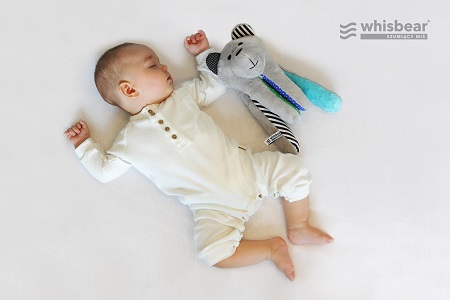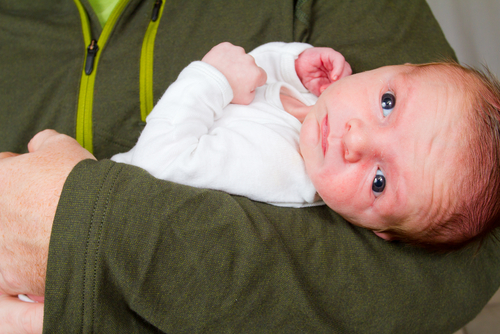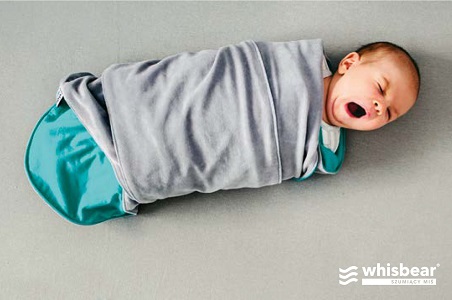When your baby is crying, you want to soothe them as soon as possible. Our instinct tells us to do so. We understand that crying is a form of communication and there is no need to panic each time the little one is fussy. However, we should try to fulfil their needs!
I’ve made a short list of the most effective soothing methods. Maybe you can add another piece of advice, something you’ve discovered on your own?
What can you do when a new-born or infant is crying at the top of their voice?
1. Hug them!
Most of the time babies do not cry because they’re hungry, but because they need to be close to their parents. Hug them, keep them close to your chest. If possible, unbutton your shirt, undress thebaby and embrace skin to skin. This increases the level of oxytocin, a hormone that plays a vital role in the social bonding and encourages safety feeling. It’s very important for both of you!

2. Feed them!
If the baby’s mouth is searching for something, if they are moving their head or sucking fingers – they tell you that they’re hungry. Crying may be also caused by dehydration – breast milk, for example at the very start of the feeding is more watery and is a great thirst quenching drink. However, breast-sucking is much more than just a mean of sustenance. Sometimes,the little one just needs to suck and is a very soothing activity for them. During the first weeks of lactation it is better to avoid giving dummies. Frequent breast-sucking stimulates breast milk production and has many other benefits. You can breast-feed your little one even a dozen times per day.
3. Listen to white noise
White noise – set to correct volume and tone – is very soothing for little babies. It is the same sound babies hear while they’re still in their mother’s womb and the same as produced by Whisbear theHumming Bear. The Bear is safe and easy to use and Whisbear’s noise is neitherto too loud nor too long. Thanks to the CRYsensor – it automatically turns on when your baby begins to cry.
White noise research proves that it is an effective method to soothing babies who suffer from colic. Random sampling studies conducted in 2016 at Dumlupinar University (Turkey) proved that white noise is a more effective method than rocking.

4. Change the nappy
Although modern nappies can hold a lot, we should remember that infant’s skin is very sensitive. A “compress” made of a heavy, cold, wet or dirty nappy irritates the soft skin and can be very painful.
5. Adjust clothes to the conditions
Little babies are not great at thermoregulation. Babies may be too cold, or much more often – too hot. Touch the back of their neck to check if they’re sweating or feel too cold. Don’t use the temperature of feet or hands for guidance. It will easily mislead you!
6. Talk to them
Studies show that the sounds in the upper register, which we instinctively use when we talk to infants, have a soothing influence on babies. Eye contact and calm, kind face are also extremely important. Adult faces – father’s, mother’s – are the source of information about the world. If the face the baby sees is devoid of emotions (thoughtful, angry) or if it is sad or anxious – the baby senses it and feels bad.
7. Rock
Rocking babies in arms, in a cradle, rocker, bouncer, car seat soothes them. Over 9 months of pregnancy the baby got used to rocking and likes it. However, don’t overdo it and always observe your child. Are they enjoying the kind of rocking we’re offering, or is it surprising, unexpected, strange and the baby quietens down and freezes waiting for the“earthquake” to stop?

8. Hold
Infants love to be held and carried because of the rocking movement that stimulates the vestibular system, and because of being close to parents. Demanding to be held is natural and understandable. Carry your baby as often as your intuition tells you, they won’t “get addicted” or“spoilt” as some people suggest. If your child really loves being carried, try out a baby sling. It soothes babies, helps them fall asleep and prevents colic.
9. Quieten down
At first infants don’t notice the noise around them, but over time their hearing improves and when they’re 3 months old they become quite sensitive to stimuli. They are curious about a dog barking nearby, car engines, leaves rustling outside, conversations, music… But if there are too many stimuli, and they are accompanied with flashing lights, strong scents and their parent’s anxiety, then at some point it is just too much! A fussy baby should be protected from too many stimuli: avoid noisy and crowded places, guests, switch off the TV (which is not recommended for a lot of other reasons, for example it impedes speech development).
10. Wrap
Wrap your baby tightly in a blanket, muslin square or a swaddle blanket to soothe them. During the pregnancy period, thebaby got used to the “cramped” conditions, warmth and the constant pressure of amniotic fluid on their skin. After birth, your baby may be afraid of cold and open spaces that can make it difficult for them to control limb movement.
Observe your baby and see if they like being tightly wrapped. However, being wrapped makes finger sucking difficult but remember not every child wants to do it.

11. Bathe
When my daughters were small and nothing could make them happy, I’d bathe them in warm water (not too warm, 37 C / 98 F is enough). It usually helped, since warmth has a relaxing quality. Some children feel better if you put them into the bathtub in a towel: wrap the baby with a soft towel and loosen it once the baby is in water.
12. Calm… yourself
Infants and little children absorb their parents’ emotions like a sponge. Studies show that even while asleep they register alarming sounds nearby, such as crying or arguments. It does not mean that you should contain your emotions for the baby’s sake. It won’t help, the baby knows what you feel. Have you noticed that babies don’t want to sleep when you really, really want them to? They sense your anxiety, tiredness, and hurry and can’t relax. That’s why you should take care of yourself – rest, have relaxing conversations, release the tension. We all need this – the youngest family members too!













